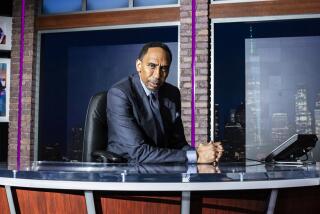Bringing a New View to Airwaves
- Share via
After the riots last spring, Errol Smith knew just what to do. He got together some of the other black entrepreneurs he knows and proposed a plan. Then, on May 26, he went on the air.
Thus began what may be the most unusual response by any business owner to the looting, burning and death that swept Los Angeles after four white police officers were acquitted of charges arising from the videotaped beating of black motorist Rodney King.
Smith’s response is unusual not just because he took to the airwaves by persuading several associates to sponsor an hourlong call-in show on KIEV radio. It’s also unusual because of the group’s premise, which is that empowerment as it is understood by blacks in business--”the focus being self-reliance and economic development,” Smith says--is rarely the subject of the black leaders usually seen in the media.
Smith’s backers hope the show will go into syndication, but their main goal “is to let people know there’s another point of view as far as the black community is concerned,” says Will L. Weatherspoon II, who owns Sterling Home Care Medical Systems in City of Industry and is one of Smith’s investors.
In this day of Geraldo and Oprah, Howard Stern and Rush Limbaugh, Smith’s program is especially noteworthy because it manages to remain absorbing week after week not by emphasizing space aliens, weight loss or polemics, but with a thoughtful and unrelenting focus on the issues.
Every Tuesday at 3 p.m. at 870 on the AM dial, “Head to Head with Errol Smith” tackles urgent topics relating to race, but of interest to all. Equally unusual, Smith’s show is informed by an understanding of business.
The host is, after all, chief executive and co-owner of a $5-million-a-year company, Glendale-based Building Maintenance of America, which subcontracts office maintenance work, mostly to Korean, Filipino and Latino immigrants.
But Smith is also a well-read autodidact who worries that Los Angeles will succumb to escalating tribalization.
“We’re either in the process of becoming a very Balkanized city with various ethnic groups fighting each other, or we’re going to become a cosmopolitan world-class business center,” he says.
Smith’s technique is to give his guests plenty of rope and let them hang themselves. Often hosting a pair of opponents on a given issue, Smith does his homework and lays his visitors bare with his innocent-seeming questions.
His program also distinguishes itself by its guests. Instead of Charles Nelson Reilly or Men Who Cooked and Ate Their Pets, his have included black activist Danny Bakewell, author Joel Kotkin, Los Angeles County Supervisor Yvonne Braithwaite Burke and political scientist Andrew Hacker, whose book, “Two Nations: Black and White, Separate, Hostile and Unequal,” has generated much attention.
One remarkable Smith interview was with Sgt. Stacy Koon, one of the officers in the King case, and Mafundi Jitahadi, head of the Coalition Against Police Abuse. At one point, Smith pressed Jitahadi to say whether, given the city’s violence, he would ever want to be a Los Angeles police officer. Then he pressed Koon to imagine himself an innocent young black or Latino man: “Imagine you get jacked up. How would you feel?”
Smith is a reasonably even-handed questioner, but his perspective is clear: “You can spend all the money you want on social programs supported by liberals, you can enact all the enterprise zones and tax breaks conservatives might want, and it won’t help,” he says. “Black people need to focus on capability and enterprise.”
He adds that blacks in business need to speak out about the problems of black families, the need for scholastic achievement, and in condemnation of lawlessness, even if it means criticizing other blacks. What counts, he says, are values.
Reveling in political incorrectness, Smith is a 37-year-old Harlem native who knows discrimination first hand. When he moved to Southern California after six years in the Air Force, he figured Beverly Hills would be a pretty nice place to live, so he knocked on doors wherever he saw a “For Rent” sign in town.
“But I was always just barely too late,” he says. “They always said, ‘Oh, what a shame, I just rented the place.’ ”
Undeterred, Smith finished his schooling at Cal State Los Angeles and got into business. In many ways, he’s a classic Southern California entrepreneur: he’s a superb salesman, his business is connected with real estate, and he doesn’t shy from risk. Our first interview was conducted partly in an airplane the size of a Toyota (with the engine of a Yugo, it seemed), which Smith had decided to fly to Santa Barbara for lunch.
Starting a radio show with your friends’ money and using it to espouse certain views--that racism isn’t the biggest problem in South-Central Los Angeles, for instance, or that gang members aren’t community spokesmen--isn’t the safest proposition in the world for an African-American businessman.
With a wicked laugh, Smith readily agrees that he can say things many white commentators feel they can’t. In a show about Marge Schott, for instance, the Cincinnati Reds owner whose racial and ethnic slurs led to a yearlong suspension from organized baseball, Smith found himself defending her right to free speech.
Smith’s backers say the show is starting to build a following, which is good news. Says Kotkin: “If Los Angeles has a future, it’s going to be because of people like Errol.”
More to Read
Sign up for Essential California
The most important California stories and recommendations in your inbox every morning.
You may occasionally receive promotional content from the Los Angeles Times.













